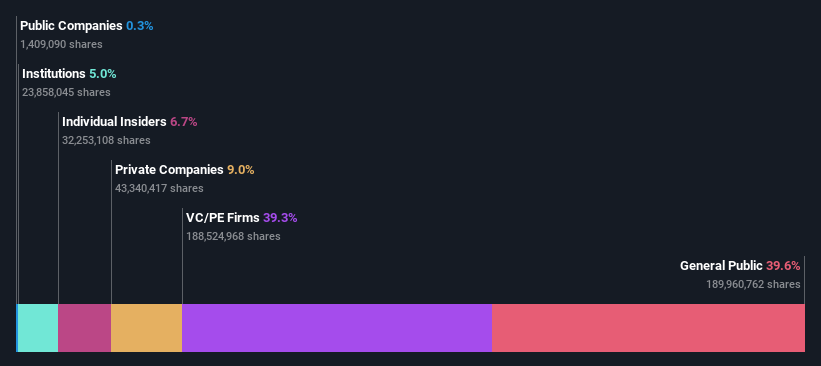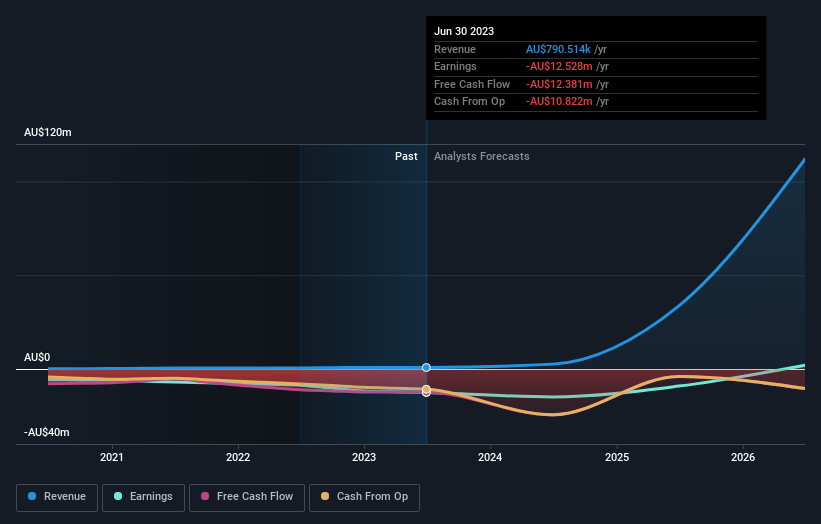Retail investors are Amaero International Ltd's (ASX:3DA) biggest owners and were rewarded after market cap rose by AU$14m last week
Key Insights
Amaero International's significant retail investors ownership suggests that the key decisions are influenced by shareholders from the larger public
The top 4 shareholders own 52% of the company
A look at the shareholders of Amaero International Ltd (ASX:3DA) can tell us which group is most powerful. We can see that retail investors own the lion's share in the company with 40% ownership. That is, the group stands to benefit the most if the stock rises (or lose the most if there is a downturn).
As a result, retail investors were the biggest beneficiaries of last week’s 10% gain.
In the chart below, we zoom in on the different ownership groups of Amaero International.
See our latest analysis for Amaero International
What Does The Institutional Ownership Tell Us About Amaero International?
Institutional investors commonly compare their own returns to the returns of a commonly followed index. So they generally do consider buying larger companies that are included in the relevant benchmark index.
Since institutions own only a small portion of Amaero International, many may not have spent much time considering the stock. But it's clear that some have; and they liked it enough to buy in. If the business gets stronger from here, we could see a situation where more institutions are keen to buy. When multiple institutional investors want to buy shares, we often see a rising share price. The past revenue trajectory (shown below) can be an indication of future growth, but there are no guarantees.
Amaero International is not owned by hedge funds. Our data shows that Pegasus Growth Capital is the largest shareholder with 39% of shares outstanding. With 4.4% and 4.3% of the shares outstanding respectively, Rosewood Engineering Pty Ltd and Omer Granit are the second and third largest shareholders. Omer Granit, who is the third-largest shareholder, also happens to hold the title of Member of the Board of Directors.
Our research also brought to light the fact that roughly 52% of the company is controlled by the top 4 shareholders suggesting that these owners wield significant influence on the business.
While studying institutional ownership for a company can add value to your research, it is also a good practice to research analyst recommendations to get a deeper understand of a stock's expected performance. There is some analyst coverage of the stock, but it could still become more well known, with time.
Insider Ownership Of Amaero International
The definition of company insiders can be subjective and does vary between jurisdictions. Our data reflects individual insiders, capturing board members at the very least. Company management run the business, but the CEO will answer to the board, even if he or she is a member of it.
Most consider insider ownership a positive because it can indicate the board is well aligned with other shareholders. However, on some occasions too much power is concentrated within this group.
We can see that insiders own shares in Amaero International Ltd. In their own names, insiders own AU$10m worth of stock in the AU$153m company. This shows at least some alignment, but we usually like to see larger insider holdings. You can click here to see if those insiders have been buying or selling.
General Public Ownership
The general public-- including retail investors -- own 40% stake in the company, and hence can't easily be ignored. While this size of ownership may not be enough to sway a policy decision in their favour, they can still make a collective impact on company policies.
Private Equity Ownership
Private equity firms hold a 39% stake in Amaero International. This suggests they can be influential in key policy decisions. Sometimes we see private equity stick around for the long term, but generally speaking they have a shorter investment horizon and -- as the name suggests -- don't invest in public companies much. After some time they may look to sell and redeploy capital elsewhere.
Private Company Ownership
We can see that Private Companies own 9.0%, of the shares on issue. It might be worth looking deeper into this. If related parties, such as insiders, have an interest in one of these private companies, that should be disclosed in the annual report. Private companies may also have a strategic interest in the company.
Next Steps:
While it is well worth considering the different groups that own a company, there are other factors that are even more important. Consider for instance, the ever-present spectre of investment risk. We've identified 3 warning signs with Amaero International (at least 1 which is significant) , and understanding them should be part of your investment process.
If you would prefer discover what analysts are predicting in terms of future growth, do not miss this free report on analyst forecasts.
NB: Figures in this article are calculated using data from the last twelve months, which refer to the 12-month period ending on the last date of the month the financial statement is dated. This may not be consistent with full year annual report figures.
Have feedback on this article? Concerned about the content? Get in touch with us directly. Alternatively, email editorial-team (at) simplywallst.com.
This article by Simply Wall St is general in nature. We provide commentary based on historical data and analyst forecasts only using an unbiased methodology and our articles are not intended to be financial advice. It does not constitute a recommendation to buy or sell any stock, and does not take account of your objectives, or your financial situation. We aim to bring you long-term focused analysis driven by fundamental data. Note that our analysis may not factor in the latest price-sensitive company announcements or qualitative material. Simply Wall St has no position in any stocks mentioned.

 Yahoo Finance
Yahoo Finance 

